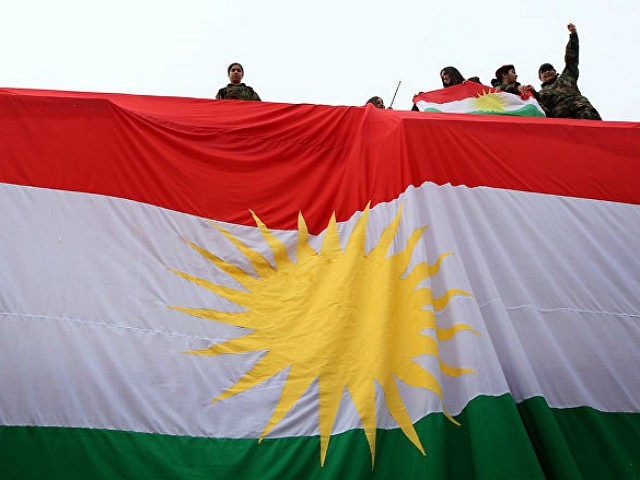Iraqi Kurdish Leader Vows to Strengthen Unity with Persecuted Christians
 TOPSHOT – Iraqi Kurdish youths wave a national flag as they stand above a giant flag of Kurdistan during celebrations of Flag Day on December 17, 2015 in Arbil, the capital of the autonomous Kurdish region in northern Iraq. / AFP / SAFIN HAMED (Photo credit should read SAFIN HAMED/AFP/Getty Images)
TOPSHOT – Iraqi Kurdish youths wave a national flag as they stand above a giant flag of Kurdistan during celebrations of Flag Day on December 17, 2015 in Arbil, the capital of the autonomous Kurdish region in northern Iraq. / AFP / SAFIN HAMED (Photo credit should read SAFIN HAMED/AFP/Getty Images)
by Edwin Mora7 Aug 20171
The president of northern Iraq’s autonomous Kurdistan region, in commemorating the 84th anniversary of the former Iraqi kingdom’s massacre of thousands of Christians in the country, declared that history would not repeat itself in an independent Kurdistan, vowing that the Kurds will protect the “demands and rights” of Assyrian Christians.
“Now that the nation of Kurdistan is taking steps toward independence, the demands and rights of Christian brothers and sisters in Kurdistan will be protected in all stages, fraternity and coexistence in Kurdistan will be stronger,” wrote Kurdistan Regional Government (KRG) President Masoud Barzani in a statement issued Sunday to mark the anniversary of the 1933 Assyrian Christian massacre, according to Rudaw.
“The only medicine for all our pains and the only guarantee to ensure that disasters are not repeated is to take steps toward independence,” he added.
In September, the KRG will hold an independence referendum vote that is expected to pass in favor of an independent Kurdish country.
Kaldo Ramzi, a Chaldean Christian who serves as the media director for the Assyrian Democratic Movement, highlighted the possibility of internally displaced Christian people participating in the referendum.
advertisement
Thousands of Christians, along with other minority groups, flocked to the KRG, fleeing deadly persecution at the hands of the Islamic State (ISIS/ISIL).
Ramzi pointed out, “We [Christians] have emphasized [to President Barzani] that our name, symbols, and language haven’t been incorporated into Kurdistan. We do need some people to participate [in the referendum], but they shouldn’t feel obligated to participate.”
Some Yazidis have accused the KRG of trying to coerce them into supporting the independence referendum.
The anniversary of the August 7, 1933, kingdom of Iraq genocide that killed nearly 3,000 Assyrian Christian fell close to the day commemorating the 2014 invasion of Christian lands by the Islamic State (ISIS/ISIL).
“On occasion of the 84th anniversary of this disaster which is concurrent with the third anniversary of the ISIS brutal attack on Christian brothers and sisters and other communities in Nineveh plains,” he added, “I reiterate that Christian brothers and sisters along with all the other communities of Kurdistan in the past, now and in the future, times of pain and success, have been involved and share the same destiny.”
Northern Iraq’s Nineveh plains, a region in the country’s Nineveh province, is the historical homeland of the Iraqi Christian community, considered one of the oldest in the world.
Nineveh province was once the home to the largest concentration of ethnoreligious minority groups in Iraq, including Christians.
While some Assyrian Christians have accused the KRG Kurds of stealing their land in northern Iraq, many others fled to the Iraqi Kurdistan region, seeking refuge from ISIS.
The United States considers the KRG’s Peshmerga forces to be one of the most effective troops against ISIS jihadists.
Officials from the U.S. and United Nations have acknowledged that ISIS engaged in a genocide campaign against various ethnoreligious groups in Iraq, including Christians and Kurds.
“The Simele massacre [of Assyrians] is part of the hardship and calamities which happened to all the people of Kurdistan,” proclaimed KRG President Barzani, referring to the 1933 incident. “It is also strong evidence that partnership has been meaningless in the state of Iraq, genocide, extermination, and massacres have been the share of social and religious makeup of the country.”
Prior to ISIS, an estimated 400,000 Christians were living in Iraq, including the KRG region.
Only about half that many Christians remain in Iraq now, with the vast majority of them having fled to Lebanon, Sweden, Australia, and other western states, reports Rudaw, citing community leaders.
http://www.breitbart.com/national-security/2017/08/07/iraqi-kurdish-leader-vows-to-strengthen-unity-with-persecuted-christians/
